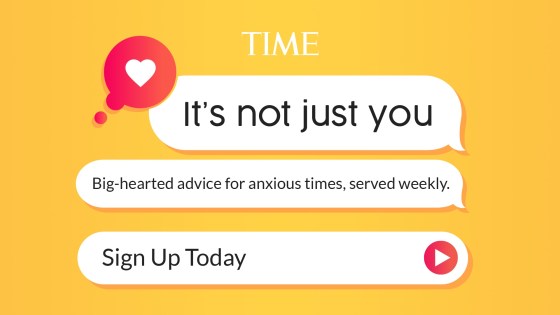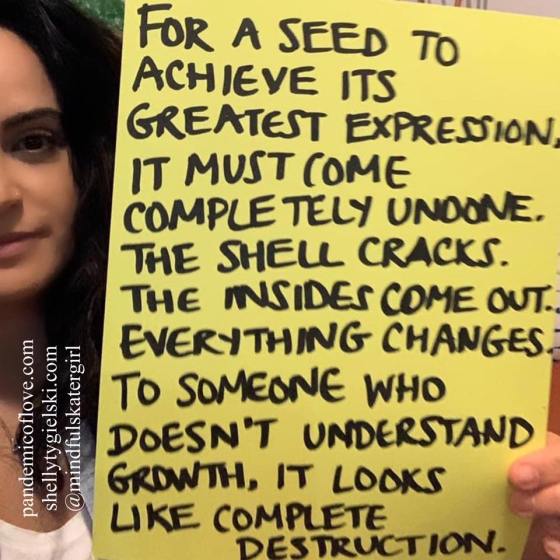A version of this article appeared in this week’s It’s Not Just You newsletter. SUBSCRIBE HERE to have an It’s Not Just You essay delivered to your inbox every Sunday.
March is the anteroom of months. It’s both the end of last year’s winter and the beginning of the new year’s spring. It’s half slush, half-quixotic hope.
I had my first baby in March–a child that arrived nine days late, already a solid little being with startling almond eyes and the appetite of a toddler. I had no idea what I was doing; we two just hunkered down and tried to figure each other out.
I still flounder at the start of every March, for different reasons every year, staggering out of February a soggy, angsty creature whose clothes don’t fit.
But somehow, I slip-slide toward the end of the month, and things start to make sense. Maybe the vernal equinox is what helps get us back on track every spring. It’s that moment, usually, on the 20th or 21st of March, when the entire planet is in balance, both the northern and southern hemispheres have the same amount of daylight as darkness.
This year we could use a little vernal harmony as we emerge like moles into the sunlight after 12 months of shutdowns and loss. Hope is still skittish these days, slipping in and out of the back door. But the numbers are going in the right direction. Vaccines are here in bulk, and while distribution still feels like it was set up by the folks who brought us the Hunger Games, that’s getting better too.
My beloved Aunt Wissie even got her vaccination. She’s been on her own all this time. And she figured out where in Pennsylvania she could get an appointment, then drove hours West early in the morning to get her shot. Wissie always says, “you do the best you can with the tools you have.” And so she has done so for her 80 years. The other day, we talked about the miracle that is the COVID-19 vaccine and how, when she was young, polio terrorized many generations of parents and kids before the vaccine arrived in 1955, shutting down pools and camps every single summer.
The experts say something approaching normal is coming our way this summer. It’s like we are waiting for a blockbuster movie. And if it were, the trailer would be just a litany of ordinary events, like a newborn being handed off to a string of aunties or people eating pizza in a booth with other humans after some sort of sports event. There’d be lingering shots of people in cafes writing about old-fashioned banal worries in journals.
But for now, hope that little wraith won’t settle down. She remembers all the other times we saw numbers going the right way, and then something happened. So we will keep wearing face coverings for a little longer, maybe even trade up for a new spring mask look.
And while we wait, let’s tally all the things we’ll want to take with us out of this tunnel. And yes, there’s so much much we never want to see again (or wear again), but there’s much to hang on to as well.
For example, let’s not forget how to pay attention to what’s right in front of us. When the boundaries of your world got smaller with fewer distractions, we became much more aware of everything within that circle.
This year has been a master class in observation. Like how we learned to really look at nature–whatever scrap of it was nearby. All the weird berries and bugs and plants and trees were always out there, undergoing dramatic changes every four months. Most of us city-folk just walked on by on hurrying to some restaurant or movie or work—all of which I’d obviously like to hurry to soon. But I don’t want to stop noticing the small pulses of spring as they grow stronger.
Even people under 60 became obsessed with natural phenomena reporting back like breaking news if we found a new alien-looking seed pod in the park. And for a while, when commuter traffic disappeared, it was like someone turned up the bird volume, and that’s all you could hear, other than the haunting sound of ambulances in New York in April.
And in that contained sphere of us, there were the people we quarantined with: The beloveds and the roommates and the kids. On the one hand, the days blurred into endless identical cycles. But in ten years, you’ll see that roommate, and no matter how rocky things got, there will be a bond between you like going to college together or boot camp.
We also had so much time to study the faces of the ones we love, learn their ways and wants. To see what causes the shadows to appear behind their eyes. We all learned how to maneuver around each other’s moods and patterns like we were all on a ship bumping down the narrow hallways of our confinement.
That knowledge of how to be together for this long is precious. It’s as if we’ve all undergone a new version of that experiment the New York Times wrote about where they asked people who’d just met to stare into each other’s eyes for a certain amount of time and ask each other 36 questions. They fell in love or at least like.
All this mashing together has been uncomfortable and sometimes painful, especially after the first few months. Yet, we found that familiarity can sometimes breed more love. And that goes for familiarity with ourselves too. Learning to be alone with yourself, bumping into your own faults at every turn, is one of those achievements that serve you well long after forced solitude ends. It’s the ultimate skill. And if you’re lucky, there’s a dog around. Now I know why poet Mary Oliver was always writing about her canines. They are the glue holding civilization together. At the very least, they force us to put pants on and leave the house regularly.
That baby I had in March is now back at college, and so is their sibling. Until a few weeks ago, we three were rattling around in our 1100 square feet of Brooklyn, and lord, we fought at first. But I think about how I won’t forget watching the two of them, children of mine, learn to cook together–the sauces, the eggs, so many eggs cooked so many ways. I saw how they moved easily, like watch gears in the small kitchen sharing tasks without words. I had visions of them at my age, making those same dishes in some kitchen somewhere, chopping, handing plates off to each other easily because they also learned how to be grown-ups together during this endless year. So did I.
But then again, I feel as if I have to remember how to be an adult again every March. 💌
If you’re new to It’s Not Just You, SUBSCRIBE HERE to get a weekly dose delivered to your inbox for free. Send comments and suggestions to me at Susanna@time.com.

If you’re new to It’s Not Just You, SUBSCRIBE HERE to get a weekly dose delivered to your inbox for free.
COPING KIT ⛱

<strong>And that is just the point… how the world, moist and beautiful, calls to each of us to make a new and serious response. That’s the big question, the one the world throws at you every morning. “Here you are, alive. Would you like to make a comment?</strong>Herewith, a bit of a challenge from poet Mary Oliver for a muddy and muddled Spring:
We’re Having Trouble Recognizing Each Other In Masks, and It’s Getting Awkward Something for your pandemic scrapbook–amusing stories about the man who mistook his wife for a stranger and a bevy of new Biden administration officials who keep having to re-introduce themselves to each other.
Expert Advice on Getting Through the Next Phase of the Pandemic from surprising sources, like Antarctic researchers.
<strong>Fear, to a great extent, is born of a story we tell ourselves, and so I chose to tell myself a different story from the one women are told. I decided I was safe. I was strong. I was brave. Nothing could vanquish me. </strong></span> <span style="font-weight: 400;">To All the Clothes I’ve Loved Before, a meditation on one year of sweatpants, the fashion industry’s existential crisis, and what we miss about dressing up.
EVIDENCE OF HUMAN KINDNESS ❤️
Here’s your weekly reminder that creating a community of generosity elevates us all.

Jacob, a 25-year-old psychology graduate student from Southern California, filled out a Pandemic of Love form indicating that he was willing to be an “anywhere” donor, giving across state lines and to any family in need of help. He was matched with Marshall, a 55-year old construction worker in North Carolina. Marshall requested help with his rent for the month of December. Marshall had fallen behind on his rent when he contracted COVID-19 and lost 5 weeks’ worth of wages: “Things were already tight, but I was grateful to be squeaking by every month at a time when so many people are suffering.”
Marshall had a few conversations with Jacob and recalls being really impressed that someone “as young as Jacob could be so thoughtful.” After settling on what Jacob would be able to financially assist Marshall with, Jacob sent him an email with a list of what he would need to be able to help, and then…Marshall disappeared. Jacob attempted to contact Marshall several times, worried that perhaps something bad had happened or that perhaps Marshall’s health had taken a turn for the worst.
After almost three weeks, Jacob received a call from a North Carolina number. “It wasn’t Marshall’s number, but I immediately answered because I thought maybe it was someone who read my text messages to him and saw how concerned I was about him.” On the other end of the receiver, there was silence and then, a clearing of a throat and finally the words, “Jacob, it’s Marshall, and I do believe I owe you an apology for the way I have treated you.”
Jacob was so happy to hear Marshall’s voice but equally perplexed by his opening sentence. Marshall explained that after he had gotten Jacob’s email, he clicked on the University link in his email signature, intending to learn more about Jacob’s work and studies. He explained that he was shocked to see that Jacob was a Black man and that it was hard for him to wrap his head around being helped by “someone like you.”
“Someone like me?” Jacob repeated back.
Marshall explained that because of where he was from and how he grew up, his initial reaction was an embarrassment because he was asking for help in the first place and that getting help from a Black man “did not sit well” with [him] for some reason.
“I sat with this for a long time, and I could not bring myself to tell you what my reaction was,” he said to Jacob. “I was embarrassed to ask for help but then even more embarrassed by my reaction. I work side-by-side every day with diverse people and I did not consider myself to be a racist, but meeting [Jacob] opened my eyes to the fact that I was not being completely honest about that. I knew this is not the person I want to be, but I was not sure how to come out and say it.”
Marshall told Jacob that he’d understand if he did not want to help him any longer but that he wanted him to know how he felt and why he disappeared and that he was sorry. Jacob, recognizing what a momentous shift this was for Marshall and how brave and vulnerable he had to be to even have this conversation with him, thanked Marshall for his honesty and his thoughtfulness.
“Of course, I agreed to still help Marshall,” said Jacob. Adding that it was an opportunity to “forge an even more meaningful connection with him.”
This story is courtesy of Shelly Tygielski, founder of Pandemic of Love, a grassroots organization that matches those who want to become donors or volunteers directly with those who’ve asked for help with essential needs.
🌺 Did someone forward you this newsletter? SUBSCRIBE to It’s Not Just You here.
Comments
Post a Comment